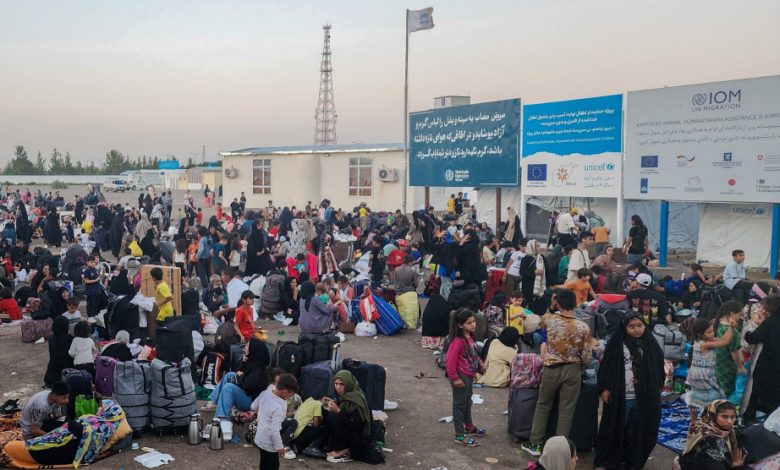
Ceasefire between Iran and Israel; More than 114,000 Afghan refugees expelled from Iran
According to national and international media reports, after the ceasefire between Iran and Israel, more than 114,000 Afghan refugees have entered the country through the Islam Qala border in the past five days.
Statistics provided to Tawheed Media show that Iran expelled 18,000 Afghan refugees on the first day of the ceasefire; an unprecedented figure. This figure also increased to 31,000 on July 24.
The expulsion process intensified on July 25, and more than 36,000 people entered Afghanistan through the Islam Qala border in Herat province. However, this wave has decreased slightly in the last two days, with 16,000 people entering Afghan soil on Friday and about 13,000 people entering Afghan soil by 4:00 p.m. local time on Saturday.
Local sources say that the wave of expulsions of refugees during the hot season and the crowding of the population in Islam Qala has increased the possibility of a severe humanitarian crisis.
According to available information, migrants are registered upon entering Islam Qala, and a number of international organizations are distributing cash to those in need. Due to the large number of people, returnees complain of a lack of transportation, basic services, and health.
According to UN reports, most of the migrants are deportees, and a limited number have returned voluntarily. Local sources in Islam Qala said that Iranian police have also deported Afghans with passports and visas.
Taliban actions
Also, according to a statement from the Herat provincial governor, a high-level delegation led by Abdul Salam Hanafi, the deputy prime minister of the Taliban government, traveled to Herat province on Saturday to closely monitor the situation at the Islam Qala border.
At the local level, Taliban officials have formed a commission to address the immediate needs of returnees, with its main focus on attracting support from private and commercial sources inside the country.
The head of the Afghan Red Crescent also called for urgent assistance from the international community for the migrants, and the UN said it needed funding to deal with the returnees.
Meanwhile, Arafat Jamal, the representative of the United Nations High Commissioner for Refugees in Kabul, referring to the situation of Afghan refugees on the Iran-Afghanistan border, said that thousands of people are returning to the country in difficult conditions.
Having personally visited the border, he said that families who have been uprooted once again are entering a land that is no longer familiar to many, with few possessions, tired, hungry and worried about an uncertain future.
According to him, women and girls are particularly concerned about restrictions that threaten their freedom of movement, their right to education and their job opportunities.
The UN High Commissioner has warned that a reduction in international support could exacerbate Afghanistan’s complex and multi-layered crises.